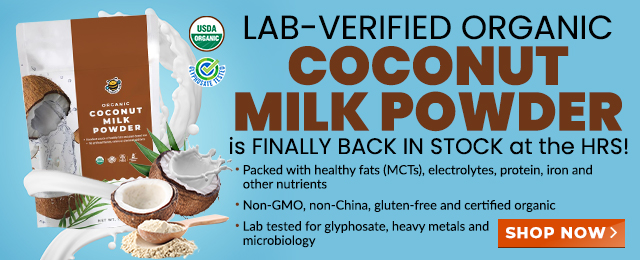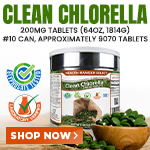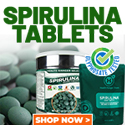
Unraveling the lies about the antioxidant study on vitamins E and C
 Monday, August 13, 2007 Monday, August 13, 2007by Mike Adams, the Health Ranger Editor of NaturalNews.com (See all articles...) Tags: antioxidants, medical myths, nutrition |
- TAKE IT DOWN Act advances in Congress amid free speech concerns
- Hospital staffers sound alarm after 10 nurses were diagnosed with BRAIN TUMORS
- Analysis: The coming economic collapse, a mass uprising and Trump's three secret weapons to halt the growing revolt
- Widespread social and economic unrest: Steve Quayle issues urgent financial warning of imminent asset collapse in new interview with Mike Adams
- Fauci is back in the limelight, and he’s busy promoting a future COVID or FLU pandemic
- Israeli lobbyists boast of controlling US national security policy in leaked AIPAC audio
- Mike Adams releases country western hit single: Goin’ Back in Time is Comin’ Home
- Tulsi Gabbard leads charge against the Biden regime’s global censorship of the 'Disinformation Dozen'
- Aerosolized bioweapons? Strange “diploid biomasses” falling out of the sky in Florida captured under the microscope
- Kiss Your Genetic Privacy Good-Bye! 23andMe Gets Green Light to Sell Your Intimate Genetic Details to Anyone They Want
- U.S. lawmakers investigate Meta over alleged China collaboration
- CLOT SHOT PLANDEMIC UNFOLDING: Fibrous, rubbery clots caused by covid injections have prion-like seeding activity
- New studies ignite debate: Fluoride linked to autism and ADHD, prompting calls for policy reassessment
- Children’s Health Defense stands firm: Based on SCIENCE and personal experiences, the MMR vaccine is NEITHER SAFE nor EFFECTIVE
- Defunding DEADLY mRNA jabs: Government funding for mRNA technology being scrutinized and sidelined until proven "safe and effective" for real
- Sen. Ron Johnson accuses CDC official in charge of COVID-19 injections of deleting records amid Congressional GOP scrutiny
- DEATH by VACCINE or face PRISON time: Canadian Freedom Convoy leaders CONVICTED for protesting forced vaccination during the Covid Plandemic
- Shedding light on the dark side of MMR vaccines: How vaccinated individuals SPREAD MEASLES & put the vulnerable at risk
- Fauci is back in the limelight, and he’s busy promoting a future COVID or FLU pandemic
- Tulsi Gabbard leads charge against the Biden regime’s global censorship of the 'Disinformation Dozen'
- Aerosolized bioweapons? Strange “diploid biomasses” falling out of the sky in Florida captured under the microscope
- Analysis: The coming economic collapse, a mass uprising and Trump's three secret weapons to halt the growing revolt
- Kiss Your Genetic Privacy Good-Bye! 23andMe Gets Green Light to Sell Your Intimate Genetic Details to Anyone They Want
- Widespread social and economic unrest: Steve Quayle issues urgent financial warning of imminent asset collapse in new interview with Mike Adams
- U.S. lawmakers investigate Meta over alleged China collaboration
- Mike Adams releases country western hit single: Goin’ Back in Time is Comin’ Home
- Chemtrails unveiled: How the CIA and Big Business are manipulating the weather for profit
- Curcumin’s ancient healing power supercharges muscle recovery, and its effects are compounded with anti-inflammatory foods and supplements
- Tulsi Gabbard takes aim at censorship: Justice for the ‘Disinformation Dozen’
- China’s counter-tariff strategies: A new chapter in the U.S.-China trade war
- CLOT SHOT PLANDEMIC UNFOLDING: Fibrous, rubbery clots caused by covid injections have prion-like seeding activity
- Israeli lobbyists boast of controlling US national security policy in leaked AIPAC audio
- European Court of Justice: Healthcare professionals who promoted or administered COVID-19 vaccines are CRIMINALLY LIABLE for any harm caused
- Defunding DEADLY mRNA jabs: Government funding for mRNA technology being scrutinized and sidelined until proven "safe and effective" for real
- DEATH by VACCINE or face PRISON time: Canadian Freedom Convoy leaders CONVICTED for protesting forced vaccination during the Covid Plandemic
- U.S. approves new Russian ambassador as diplomatic thaw continues
- Newly released JFK files reveal Pentagon's role in creating Lyme disease and covid in the same lab
- Analysis: The coming economic collapse, a mass uprising and Trump's three secret weapons to halt the growing revolt
- Mike Adams releases country western hit single: Goin’ Back in Time is Comin’ Home
- Aerosolized bioweapons? Strange “diploid biomasses” falling out of the sky in Florida captured under the microscope
- Kiss Your Genetic Privacy Good-Bye! 23andMe Gets Green Light to Sell Your Intimate Genetic Details to Anyone They Want
- European Court of Justice: Healthcare professionals who promoted or administered COVID-19 vaccines are CRIMINALLY LIABLE for any harm caused
- Federal employees whine over DOGE's new directive requiring them to do a 5-point summary of weekly accomplishments
- Dr. Mike Yeadon releases 15-minute testimony - WATCH - about genocidal intent of COVID “vaccines”
- The Health Ranger releases “Vaccine Zombie” song and music video, using AI-animated zombies for the music video
- U.S. approves new Russian ambassador as diplomatic thaw continues
- Government waste exposed: Hegseth supports Musk’s demand for accountability from federal workers
- Trump reverses course on Gaza plan, says “nobody is expelling Palestinians”
- Now you can HEAR chemistry: Health Ranger translates molecules into music in stunning video demonstration that will blow your mind (and your ears)
- 5 Simple steps to boost your brainpower: How to strengthen executive function in a distracted world
- EPA advisor admits the agency is funneling billions to climate groups ahead of Trump’s return to White House
- A lack of integrity in Academia: Harvard professor found GUILTY of fraudulent research to promote CRT theory
- Rep. Nancy Mace introduces bill to ban biological males from female facilities on federal property
- Survival 101: Effective EMF blocking techniques
- Red Cross issues warning to stop blood plasma donations from vaccinated people
- Scientists confirm: GENIUS brain function can be spontaneously unleashed in humans without any apparent cause
- EPA advisor admits the agency is funneling billions to climate groups ahead of Trump’s return to White House
- HYSSOP: What research reveals about the health benefits of this ancient holy herb
- Two containers with completed ballots fall out of truck in Florida
- Newly released JFK files reveal Pentagon's role in creating Lyme disease and covid in the same lab
- Global leaders unite to clamp down on “misinformation” with UN-backed Cascais Declaration
- BREAKING: 2025 NDAA authorizes mandatory military draft of WOMEN across America… as Pentagon pursues global NUCLEAR war with both Russia and China at the same time
- Michael Yon warns of a ZIONIST TAKEOVER in Trump’s second administration
- Mike Adams releases country western hit single: Goin’ Back in Time is Comin’ Home
- Ozempic and Wegovy weight loss drugs are injectable LIZARD VENOM PEPTIDES that may unleash a devastating wave of organ failure… side effects align with symptoms of SNAKE BITES
- The Health Ranger releases “Vaccine Zombie” song and music video, using AI-animated zombies for the music video
- BOMBSHELL: DNA testing kits are a SCAM to develop ethnic-specific bioweapons
- Israeli soldiers accused of even more torture and abuse in the West Bank
- These 13 countries just signed an agreement to engineer a global FAMINE by destroying food supply
- NASA admits that climate change occurs because of changes in Earth’s solar orbit, and NOT because of SUVs and fossil fuels
- RFK Jr. clears key hurdle: Sen. Susan Collins backs controversial HHS nominee, signaling a new era for health policy
- Sermon 30: How Jesus reveals Caesar’s FAKE CURRENCY and FALSE AUTHORITY
Despite these encouraging findings about the positive impact of antioxidants on health, nearly all the headlines in the mainstream media today are proclaiming vitamins E and C to be useless. In classic doublespeak, one press release blares, "Vitamin C and Other Antioxidant Vitamins Provide No Protection from Cardiovascular Events." This particular distortion comes from the drug-touting Brigham and Women's Hospital (BWH), an affiliate of Harvard Medical School. BWH goes on to state, "researchers... have found that there is no evidence of benefit or risk from vitamins C, E or beta-carotene on cardiovascular events for women at a high risk for cardiovascular disease (CVD)."
Other medical associations and pharmaceutical-affiliated groups are making similar pronouncements. Vitamins C and E, according to them, are nutritionally worthless. And they're basing that conclusion on a study that actually showed the vitamins to be far better at preventing cardiovascular disease than any prescription drug!
How to lie with statistics
So how can anyone claim these vitamins are worthless when the study clearly shows a strong, significant health benefit in those who take the vitamins? It's simple: the results of the study can be made to look poor by counting the results of all the people who didn't take the vitamins!Let me explain this again to make sure I'm communicating this properly: Overall, if you look at the entire group of women followed in this study, you find that cardiovascular protective benefits were only marginal: An 11 percent reduction in the risk of combined cardiovascular disease. But that benefit is diluted by the fact that it includes all the women who neglected to actually take the vitamins! If you include only the women who complied with taking the vitamins on a regular basis, the results increase substantially and become quite significant with a 31 percent reduction in the risk of stroke and 22 percent reduction of risk in heart attacks. In other words, those women who actually took vitamins E and C experienced substantial benefits from doing so. Those who neglected to take the vitamins, not surprisingly, had little or no benefit.
Pushers of pharmaceuticals, of course, want to make vitamins look bad. So they quote the results that include people who never even took the vitamins. "See?" they say. "The benefits aren't there." Of course they aren't! It's like taking a room full of a hundred hungry children, handing fifty of them a large sandwich, then declaring that sandwiches don't work as food because half the room is still hungry.
That these figures would even be quoted as something resembling "scientific medicine" is laughable. The defenders of pharmaceuticals have become so desperate to discredit antioxidants and nutrition in general that they have now resorted to quoting study results from people who didn't even take the vitamins! I'm not sure if this strategy is brilliant or idiotic: It's brilliant because the mainstream media swallows the story hook, line and sinker (journalists aren't very skeptical anymore...). It's idiotic because it's based on a logic gap so large you could drive a circus convoy through it. If you're going to test the effectiveness of something, it only makes sense that you have to exclude the results of those people who didn't take it.
Notice that with drug studies, researchers routinely exclude those who did not comply with taking the drug. They don't test a drug on 1000 people, but count the results on 2000 people, half of which never took the drug. They only track results based on those who actually took the drugs. It's common sense.
Desperate to discredit vitamins
But when profits are at stake, and there's an industry-wide propaganda campaign to push onto the public, common sense gets thrown out the window. Scientific scrutiny turns to wishy washy statistical foolery disguised as authoritative proclamations about nutrition. This, in turn, quickly devolves into nutritional nonsense. The message from industry is very clear: Don't take vitamins! And if they have to lie with statistics by making a positive study look negative, they're more than willing to step up to the plate and state the indefensible, almost as if they lived in some alternate universe where the laws of logic have all been reversed.In fact, the message from the Brigham and Women's Hospital is quite clear. As JoAnn Manson, MD, chief of Preventive Medicine at BWH and principal investigator of WACS said (with my translation in brackets), "This research underscores the importance of focusing on proven methods for preventing cardiovascular disease, including physical activity, healthy diet, controlling high blood pressure and high cholesterol [i.e. using pharmaceuticals], maintaining healthy weight, and avoiding tobacco."
In other words, she's saying:
• Antioxidants are "unproven."
• Cardiovascular disease can only be prevented, in part, by using pharmaceuticals.
• We should stop spending time on nutritional supplements.
(In modern medical lingo, any statement about "controlling high blood pressure" or "controlling high cholesterol" or even "controlling blood sugar" actually means taking pharmaceuticals to control those numbers. So when researchers say that people need to "control their high blood pressure" what they're really saying is that people should take high blood pressure drugs.)
It's a message that might as well have been announced from the Big Pharma Glee Club, or the FDA cheerleading squad.
Pushing the pro-Pharma propaganda
Sadly, the mainstream media will buy this distortion, reprint it, and thereby spread disinformation to the public which is already half scared of vitamins thanks to all the other fear tactics being pushed by today's oppressive medical system. But let's get down to reality here for a moment, shall we? Drugs have no natural place in the human body, period. There is no disease caused by a deficiency of pharmaceuticals, and most of the drugs being marketed today are pushed under the most ridiculous advertising claims and distorted medical "science." Properly-prescribed, FDA-approved drugs are right now the 3rd leading cause of death in America, and even those individuals who aren't killed by the drugs suffer rapidly declining health when taking them. (Have you ever seen anyone take prescription drugs for a few months and get so healthy that they stopped needing the drugs? Of course not.)Nutrition, on the other hand, is 100% biocompatible with the human body, and nutrition produces exceptional results in restoring and supporting human health. Nobody has ever been killed by antioxidants, or superfoods, or vitamins E and C. Not a single person. Billions of people have been helped by these substances, and nutrition, in fact, is the answer to our health care problems. If we taught people the truth about nutrition, they wouldn't need prescription drugs! That's precisely why nutrition must be attacked, by the way: Vitamins threaten the profits of drug companies because vitamins and dietary supplements actually work to prevent disease and keep people healthy!
Anyone who thinks drugs are the answer -- and that antioxidants are useless -- is probably suffering from the cognitive impairment side effects of drugs they're on right now. You'd have to be truly out of your mind to think that plant-based nutrition has no role in human health and that only pharmaceuticals can prevent disease.
Yet this remains the dominant mindset in conventional medicine today. It is a mindset based on deliberate falsehoods, scientific distortion and outright lies. And right now, you're witnessing yet another attempt to disinform the public about the promise of antioxidants.
Personally, I take antioxidants every day. I also eat raw foods, drink superfood smoothies and avoid all prescription drugs. And I have yet to meet any person on pharmaceuticals who even compares to the level of health that I (and many others like me) experience on a daily basis. You show me somebody taking twelve prescription drugs, and I'll show you someone with a toxic liver, impaired brain function, stressed kidneys and unhealthy blood. Drugs don't make people healthy. And most drugs, by the way, actually deplete the body of essential nutrients.
Remember: The first thing that goes when you take pharmaceuticals is your mind, and with that you lose your ability to think clearly. That's when the drug companies, hospitals, FDA and everybody else depending on the current drug marketing racket steps in and tries to convince you to stop taking nutritional supplements and surrender to a (short) life of pharmaceuticals.
Pushing drugs and abandoning the people
For the Brigham and Women's Hospital, I think this action we're seeing today is yet another example of how organizations that once accomplished meaningful work have apparently sold their souls to Big Pharma and now operate as little more than drug company front groups. Gee, I wonder where their funding comes from?To show you just one tiny example of how closely tied Brigham and Women's Hospital is to the financial influence of drug companies, consider the bio of one senior investigator working at the hospital: Christopher P. Cannon, M.D., F.A.C.C. According to this author disclosure, Christopher has received all the following research grants (all of which are greater than $10,000 each, with the actual amounts not disclosed):
Merck/Schering Plough Partnership, Significant (>= $10,000)
AstraZeneca , Significant (>= $10,000)
Glaxo Smith Kline, Significant (>= $10,000)
Sanofi-aventis/Bristol-Myers Squibb Partnership, Significant (>= $10,000)
Schering Plough, Significant (>= $10,000)
Merck, Significant (>= $10,000)
... and all that is from just one person. Do you really think a hospital staffed by doctors receiving hundreds of thousands of dollars from drug companies is going to acknowledge that cardiovascular disease can be prevented without drugs by simply taking low-cost antioxidant vitamins?
Of course not. And that's why their press release about the antioxidant study is, in my opinion, a fantastic example of outrageous intellectual dishonesty in medicine today. These people are so intoxicated by drug money influence that they calculate statistics like drunken sailors and practice medicine like quacks. We would all do well to flee from their dishonest proclamations and get back to the basics of preventing disease with nutrition, not treating it with high-profit synthetic chemicals.
Antioxidants at FETCH.news
Get independent news alerts on natural cures, food lab tests, cannabis medicine, science, robotics, drones, privacy and more.
 About the author:Mike Adams (aka the "Health Ranger") is a best selling author (#1 best selling science book on Amazon.com) and a globally recognized scientific researcher in clean foods. He serves as the founding editor of NaturalNews.com and the lab science director of an internationally accredited (ISO 17025) analytical laboratory known as CWC Labs. There, he was awarded a Certificate of Excellence for achieving extremely high accuracy in the analysis of toxic elements in unknown water samples using ICP-MS instrumentation. Adams is also highly proficient in running liquid chromatography, ion chromatography and mass spectrometry time-of-flight analytical instrumentation.
About the author:Mike Adams (aka the "Health Ranger") is a best selling author (#1 best selling science book on Amazon.com) and a globally recognized scientific researcher in clean foods. He serves as the founding editor of NaturalNews.com and the lab science director of an internationally accredited (ISO 17025) analytical laboratory known as CWC Labs. There, he was awarded a Certificate of Excellence for achieving extremely high accuracy in the analysis of toxic elements in unknown water samples using ICP-MS instrumentation. Adams is also highly proficient in running liquid chromatography, ion chromatography and mass spectrometry time-of-flight analytical instrumentation.
Adams is a person of color whose ancestors include Africans and Native American Indians. He's also of Native American heritage, which he credits as inspiring his "Health Ranger" passion for protecting life and nature against the destruction caused by chemicals, heavy metals and other forms of pollution.
Adams is the founder and publisher of the open source science journal Natural Science Journal, the author of numerous peer-reviewed science papers published by the journal, and the author of the world's first book that published ICP-MS heavy metals analysis results for foods, dietary supplements, pet food, spices and fast food. The book is entitled Food Forensics and is published by BenBella Books.
In his laboratory research, Adams has made numerous food safety breakthroughs such as revealing rice protein products imported from Asia to be contaminated with toxic heavy metals like lead, cadmium and tungsten. Adams was the first food science researcher to document high levels of tungsten in superfoods. He also discovered over 11 ppm lead in imported mangosteen powder, and led an industry-wide voluntary agreement to limit heavy metals in rice protein products.
In addition to his lab work, Adams is also the (non-paid) executive director of the non-profit Consumer Wellness Center (CWC), an organization that redirects 100% of its donations receipts to grant programs that teach children and women how to grow their own food or vastly improve their nutrition. Through the non-profit CWC, Adams also launched Nutrition Rescue, a program that donates essential vitamins to people in need. Click here to see some of the CWC success stories.
With a background in science and software technology, Adams is the original founder of the email newsletter technology company known as Arial Software. Using his technical experience combined with his love for natural health, Adams developed and deployed the content management system currently driving NaturalNews.com. He also engineered the high-level statistical algorithms that power SCIENCE.naturalnews.com, a massive research resource featuring over 10 million scientific studies.
Adams is well known for his incredibly popular consumer activism video blowing the lid on fake blueberries used throughout the food supply. He has also exposed "strange fibers" found in Chicken McNuggets, fake academic credentials of so-called health "gurus," dangerous "detox" products imported as battery acid and sold for oral consumption, fake acai berry scams, the California raw milk raids, the vaccine research fraud revealed by industry whistleblowers and many other topics.
Adams has also helped defend the rights of home gardeners and protect the medical freedom rights of parents. Adams is widely recognized to have made a remarkable global impact on issues like GMOs, vaccines, nutrition therapies, human consciousness.
In addition to his activism, Adams is an accomplished musician who has released over a dozen popular songs covering a variety of activism topics.
Click here to read a more detailed bio on Mike Adams, the Health Ranger, at HealthRanger.com.
Take Action: Support Natural News by linking to this article from your website
Permalink to this article:
Embed article link: (copy HTML code below):
Reprinting this article:
Non-commercial use OK, cite NaturalNews.com with clickable link.
Follow Natural News on Facebook, Twitter, Google Plus, and Pinterest
Science News & Studies
Medicine News and Information
Food News & Studies
Health News & Studies
Herbs News & Information
Pollution News & Studies
Cancer News & Studies
Climate News & Studies
Survival News & Information
Gear News & Information
News covering technology, stocks, hackers, and more



"Big Tech and mainstream media are constantly trying to silence the independent voices that dare to bring you the truth about toxic food ingredients, dangerous medications and the failed, fraudulent science of the profit-driven medical establishment.
Email is one of the best ways to make sure you stay informed, without the censorship of the tech giants (Google, Apple, Facebook, Twitter, YouTube, etc.). Stay informed and you'll even likely learn information that may help save your own life."
–The Health Ranger, Mike Adams













































